Fisheries statementpublished at 14:00 GMT 26 February 2020
 Image source, Getty Images
Image source, Getty ImagesRural Economy Secretary Fergus Ewing is making a statement titled: "Modernising and Empowering Scotland’s Inshore Fisheries".
A budget deal between the Greens and the Scottish government has been agreed
Meanwhile the Scottish Tories lead a debate calling for more police funding, as the justice secretary tells us of £60m more for the police
The budget deal means an extra £13m going to frontline police services
Police Scotland is to get £5m more capital funding
The additional cash for cops is not enough for the Tories, Labour or the Lib Dems
Louise Wilson and Craig Hutchison
 Image source, Getty Images
Image source, Getty ImagesRural Economy Secretary Fergus Ewing is making a statement titled: "Modernising and Empowering Scotland’s Inshore Fisheries".
 Image source, Getty Images
Image source, Getty ImagesA statement on inshore fisheries kicks off the afternoon, followed by culture and education portfolio questions.
Then the Scottish Tories lead a debate on Police Scotland's budget, arguing services are "underfunded".
Finally there will be a debate to mark 10 years of the National Parents Forum.
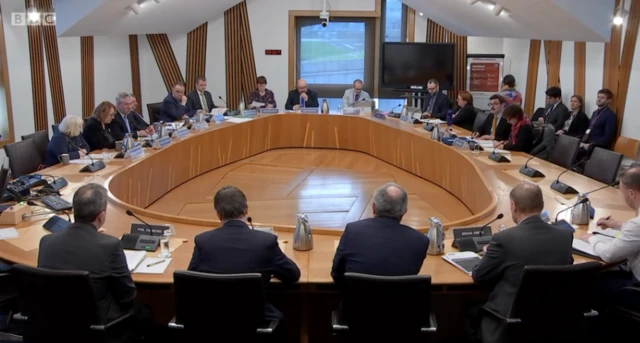
SNP MSP Sandra White suggests a comprehensive survey of buildings has to be done.
Derek Macdonald says we must be careful is there is to be a register to ensure information is not being gathered from property plans as these are not necessarily accurate.
There's got to be boots on the ground, he adds.
Cuts mean building control officers cannot get out to survey buildings and a lot of the issues mentioned may not have happened if they could, Phil Diamond states.
The convener moves the meeting into private.
Mr Simpson asks if the personal indemnity issue is something the UK government could resolve.
Brian Smith replies yes and some pressure should at least be exerted by it.
Green MSP Andy Wightman asks why properties going up today are having issues.
Mr Diamond highlights distinct difference between the building regulations and the Ministry of Housing, Communities and Local Governance guidance, with the building regulations allowing combustible cladding.
Mr Wightman asks if Scotland should ban the use of combustible material, as England and Wales have already done.
UK Finance thinks so replies Mr Jupp.
Mr Diamond says, in terms of flats, "it's crazy that we haven't already."
Graham Simpson asks about the suggestion of a Scottish government-backed insurance guarantee where cover is withdrawn or to prevent cover being withdrawn.
Derek Macdonald of PMAS says there has to be a default security arrangement for the owners of these properties.
The owners and mortgage companies thought the buildings were up to standard and it is "potentially catastrophic" if security is withdrawn.
"There needs to be some kind of backstop here."
 Douglas Fraser
Douglas Fraser
Scotland business & economy editor
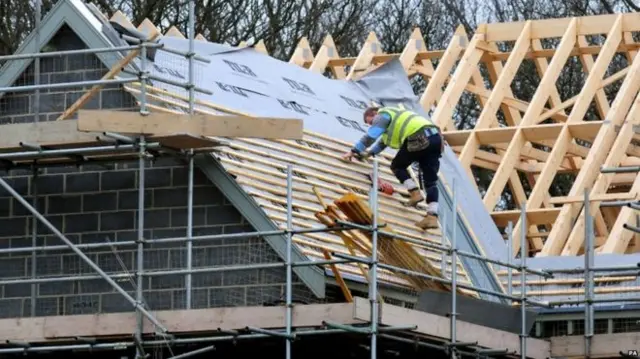 Image source, PA Media
Image source, PA MediaBuilding standards in Scotland should be enforced by a national agency, according to environment group Greenpeace.
It criticised the current system for policing building regulations which relies on builders to certify much of their work, with limited checks by council officials.
It is argued that a consistent, tougher approach would help new home buyers, ensuring quality, where some find housebuilders are slow to rectify construction problems.
The green lobby group also argues that building energy standards should be significantly stepped up, to help reduce greenhouse gas emissions.
Brian Smith points out you cannot get a building that is completely fire proof.
He warns against a knee-jerk reaction and a tolerance level must be found before regulations are set.
The Law Society of Scotland representative says this again requires leadership.
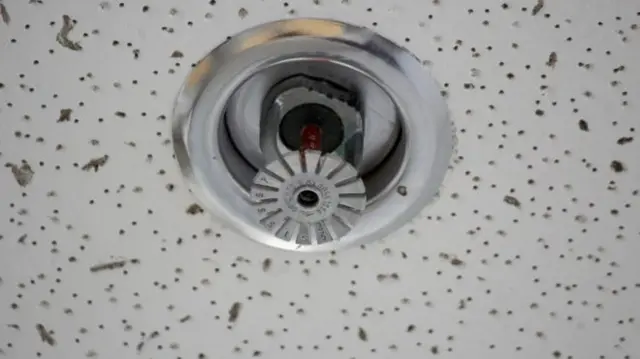 Image source, Getty Images
Image source, Getty ImagesAn MSP is to bring forward legislation to have sprinklers installed in all new-build social housing in Scotland.
Labour's David Stewart has launched a consultation on a members bill to make sprinklers mandatory in new buildings.
Inquiries following the Grenfell Tower tragedy showed that hundreds of housing blocks in Scotland do not have life-saving fire suppression systems.
The Scottish government said sprinklers were one of a number of measures being considered in an ongoing safety review.
Labour MSP Sarah Boyack wonders if leadership is needed to bring the various issues together.
Very clearly yes, replies Brian Smith.
Keith Denholm says people's lives are being put on hold and some buildings are dangerous so we need something to push us forward very quickly.
The issue with new builds could be dealt with fairly easily but the key is the legacy problems, he adds.
Allow X content?
This article contains content provided by X. We ask for your permission before anything is loaded, as they may be using cookies and other technologies. You may want to read X’s cookie policy, external and privacy policy, external before accepting. To view this content choose ‘accept and continue’.
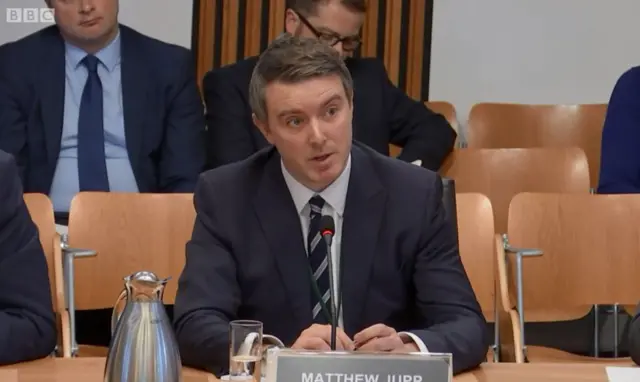
Matthew Jupp from UK Finance
Mr Denholm says there will be legal actions in due course but at the moment homeowners are left in limbo, he tells the committee.
The RICS representative calls for the Scottish government to set up a remediation fund to help homeowners who are "caught in a trap" through no fault of their own.
Matthew Jupp from UK Finance agrees, telling the committee it does not seem fair that homeowners should have to foot the bill and the government should step in.
Mr Jupp says we should make the buildings safe and then have the legal wranglings about who foots the bill.
SNP MSP Kenneth Gibson asks if the builder should be liable for poor work carried out.
Mr Smith says for bigger companies there is reputational damage, but with a single purpose vehicle, once the development is done the company ceases to exist.
He cites the fact the legal process is lengthy.
How do we solve the issue, asks Mr Balfour.
You can't solve a problem until you know what the problem is, replies Mr Smith.
He says we must find out the extent of the problem and then we can begin working out what remediation may be required.
Do we have the skills in Scotland to deal with this, asks SNP MSP Kenny Gibson.
Phil Diamond replies he believes we do, suggesting a model could be developed "fairly readily" to accelerate the response.
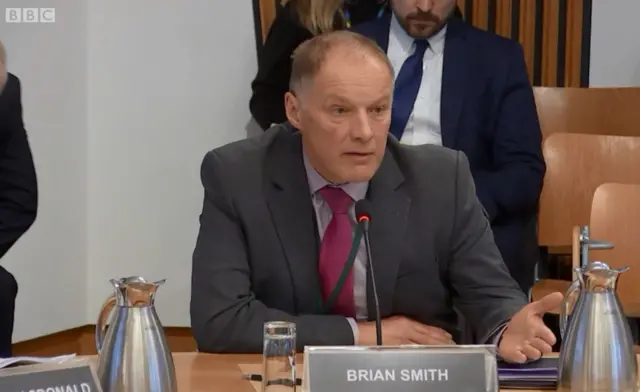
Mr Balfour asks about legal advice for clients who are interested in buying a property with a home report citing issues around cladding.
Brian Smith replies if there is an EWS1, members of the Law Society of Scotland are not qualified to comment on it and must pass the client to the author of the report.
"The system is bedding in just now."
There is a bit of inconsistency with home reports relating to cladding now, he adds.
Mr Smith says that of course leads to more uncertainty so the obvious advice would be to ask if the client is considering other options.
Tory MSP Jeremy Balfour presses on the cost of getting a survey.
Phil Diamond says his firm charges £900 for a survey plus VAT, but on top of that there will be professional indemnity costs and third party costs (such as for a cherry-picker).
This means it is often not feasible for one household to cover the cost, he says, adding "it has to be a common approach".
Mr Balfour expresses concern this could mean some homeowners are unable to sell their flats if others in their building do not also intend to sell during the period a survey would cover.
 Image source, Getty Images
Image source, Getty ImagesAll new buildings in Scotland that are taller than 11 metres have to be fitted with cladding that slows and controls the spread of fire.
The Scottish government announced the changes to building standards two years after the deaths of 72 people in the Grenfell Tower tragedy.
The move also demands the inclusion of additional escape stairs.
Each storey will also require new signs to help fire crews during evacuations.
Mr Wightman asks what happens to properties with issues on their EW1S form.
"They're stuck," replies Mr Diamond.
Keith Denholm says in Scotland there is no remediation fund set up, so unfortunately homeowners are "left high and dry".
Mr Wightman points out any remedial work would require all flat owners to agree.
Brian Smith says the biggest problem in any market is uncertainty, as buyers in particular don't like uncertainty.
The advice to a buyer will be not to purchase a property without knowing clearly what any issue is and what the remediation may be, adds Mr Smith.
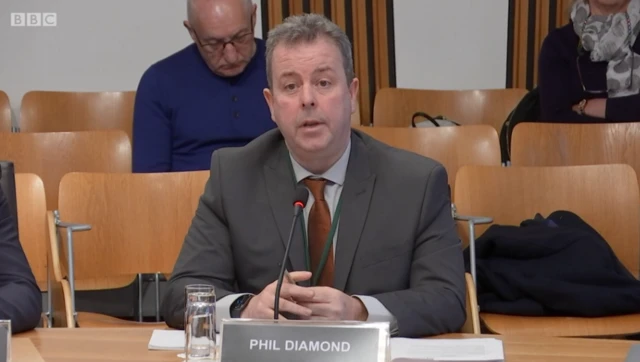
Green MSP Andy Wightman wonders if there is an idea of the scale of the problem.
The bottom line is we do not know until an inspection of a building has been undertaken, replies Keith Denholm.
Mr Wightman wonders if buildings were compliant when they were first built and if these are therefore legacy issues.
Phil Diamond says his firm is finding a range of different materials on buildings on Scotland, with two cladding systems being used: fire rated and non-fire rated.
He expresses doubt that many of the buildings would pass safety standards now but would have done at the time.
Mr Diamond explains: "There's physical failures in the way that they have actually been constructed. Missing fire breaks, stuff that's not fitted properly, omissions, swaps in materials, lack of certification - a whole range of different failures."
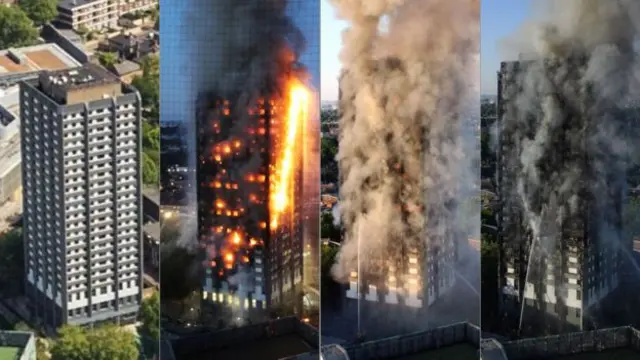 Image source, Shutterstock
Image source, ShutterstockMore than 70 people died in the Grenfell high-rise fire in London
New fire safety measures for high-rise buildings in Scotland were announced in December 2018 and introduced in August this year.
They include:
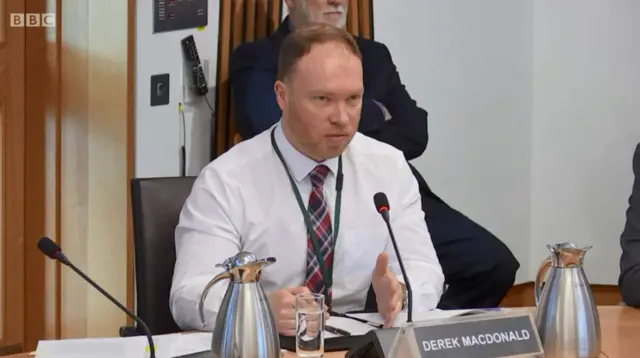 Image source, bbc
Image source, bbcDerek MacDonald from Property Managers Association Scotland
Mr Simpson asks if an individual flat owner would have to pay for an evaluation for the whole building.
We can't treat a flat in isolation replies Mr Diamond.
Derek MacDonald from Property Managers Association Scotland (PMAS) says property factors are trying to find a workaround for this, where owners agree procedures to reduce costs when an individual wishes to sell.
Mr MacDonald says if consent can be gathered from owners collectively he does not see a problem.
Matthew Jupp from UK Finance says the cladding surveys were designed to ensure only one was needed per block which would last five years. However due to differences in Scotland there have been difficulties around how this works, he adds.